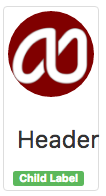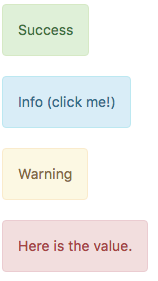Introduction to Bootstrap
This article describes Bootstrap 3. For changes in Bootstrap 4, see Bootstrap 3 vs Bootstrap 4.
Bootstrap describes itself as "the most popular HTML, CSS, and JS framework for developing responsive, mobile first projects on the web.'
It is a free and open-source front-end library for creating websites and web applications. It contains HTML- and CSS-based design templates for typography, forms, buttons, navigation and other interface components, as well as optional JavaScript extensions. It aims to ease the development of dynamic websites and web applications. Originally developed at Twitter as an internal tool, it was released as an open source project in August, 2011. Bootstrap is the second most-starred project on GitHub, with over 95 thousand stars and more than 40 thousand forks.
The main Bootstrap site is http://getbootstrap.com/.
Installation
No installation is required. AppStudio installs everything needed, both for development and at deploy time.
Features
Grids
One of Bootstraps most powerful and useful features is its use of grids to organize responsive content. This is covered in Bootstrap Grids.
Grids allow you to organize your controls into responsive blocks to handle different screen sizes. For example, an iPad might display data in two side by side blocks, where an iPhone would put the blocks one over the other.
Badges
Most controls support Badges, which are a label with some additional information. Here is a Button with a Badge:
Values of Badges can be set at design time or runtime:
Button1.badge = "Best Choice!"
To delete a badge, set its value to an empty string:
Button1.badge = ""
Controls which support Badges include Alert, Button, Checkbox, Dropdown, Heading, Input, Jumbotron, Label, Listgroup, Media, Modal, Pageheader, Panel, RadioButton, Select and Textarea.
Icons
Many controls support icons. Here is a button with an icon:
The icons come from the Font Awesome library, which at last count has over 634 icons in it. The size of the icon is determined by the font size of the control it is in.
To use an icon, put its name in to the icon property without the fa prefex. So, for fa-camera-retro, put just camera-retro.
Setting icons at runtime
To set an icon at runtime, set the complete icon class:
Button1_icon.className = "fa fa-camera-retro"
Icon Modifiers
You can modify the appearance of your icon by adding additional parameters. For example, to make a spinning bed, add fa-spin as follows:
icon: bed fa-spin
Here are some of the modifiers:
fa-lg - These modifiers change the size. fa-2x fa-3x fa-4x fa-5x fa-fw fa-spin - These modifiers rotate smoothly or in 8 steps. Work best with spinner, refresh and cog icons. fa-pulse fa-normal - These modifiers rotate the icon. fa-rotate-90 fa-rotate-180 fa-rotate-270 fa-flip-horizontal fa-flip-vertical fa-inverse - Make an inverse color. For example, white instead of black. text-muted - These modifiers change the color according to the Bootstrap theme. text-primary text-success text-info text-warning text-danger
Children
Some Bootstrap controls support adding child controls, much like the Container control does. To add a child, right click on the control in the Design Screen and select the control you would like to have added to the Bootstrap control.
The children do not have to be Bootstrap controls. Here is a Thumbnail control, with a Label added as a child:
The following controls allow children: GridColumn, GridRow, Jumbotron, Media, Modal, Panel and Thumbnail.
Popovers and Tooltips
Most Bootstrap controls allow Popovers and Tooltips. They are specified at Design Time.
| Property | Description |
|---|---|
| popBody | Body of Popover. Not used for Tooltip. |
| popClose | How should it be opened and closed? Click, Focus or Hover. |
| popPosition | Position to display the Popover when hovering over the control. Top, Left, Right or Bottom. If 'none', the Popover will not appear. |
| popStyle | Tooltip (small) or Popover (larger)? |
| popTitle | Title of Popover or Tooltip. |
The following controls support Popovers and Tooltips: Breadcrumbs, Button, Checkbox, Dropdown, Image, Input, Listgroup, Pagination, Radiobutton, Select, Tabs and Textarea.
Themes
Bootstrap comes with 17 themes built into AppStudio. There is one theme per app: all controls use that theme. The BootstrapTheme is set in Project Properties.
If you change the theme of a project, the change will go into effect in the Design Screen next time it is reloaded.
Themes supported include: bootstrap, cerulean, cosmo, cyborg, darkly, flatly, journal, lumin, paper, readable, sandstone, simplex, slate, spacelab, superhero, united, yeti. See them here.
You can also create your own custom themes. Here is a blog post on making custom themes.
Visual Effects
Appearance
Many controls have an Appearance property. This sets the color of the control to one of a set of predefined colors, based on the urgency of the control. Appearances include default, primary, success, info, warning, danger and link.
Collapse
Each Bootstrap control has a collapse function. This toggles the control between visible and invisible. The position of other controls is automatically adjusted.
Panel1.collapse()



